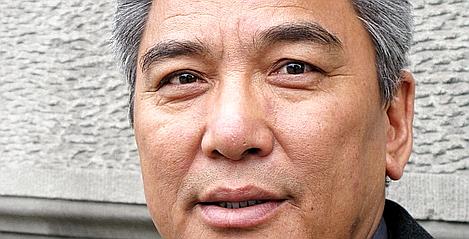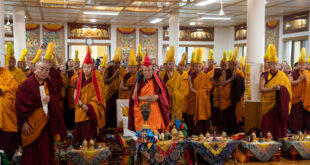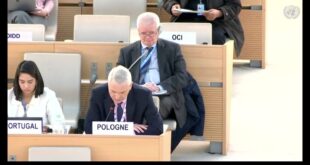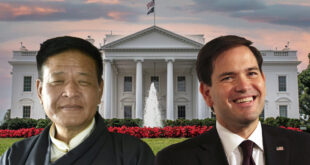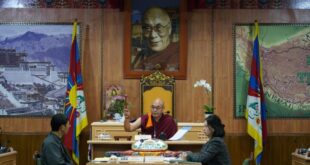by Kelsang Gyaltsen, Envoy of H. H. the Dalai Lama, February 2012
The Tibetan struggle: A case of exemplary non-violent struggle for freedom
For over five decades, under the leadership of His Holiness the Dalai Lama, the Tibetan freedom struggle has remained strictly non-violent. After the devolution of his political authority to the democratically elected leaders of the Central Tibetan Administration, the Tibetan political leadership in exile has made clear that it will continue to abide by the path of non-violence and not seek separation from China or independence for Tibet. The Central Tibetan Administration will continue to strive for genuine autonomy for the Tibetan people within the framework of the People’s Republic of China (PRC) through dialogue and negotiations. Thus, the Tibetan freedom struggle is not only an exemplary non-violent movement but is also a model for political moderation, democracy and the spirit of dialogue and reconciliation.
Tibetan resistance in Tibet remains strong

In March 2008, the third generation of Tibetans, born and grown up under Chinese Communist rule, rose up against the oppressive Chinese rule. Tibetans from all walks of life and across the entire Tibetan plateau demonstrated against the oppressive and discriminatory policies of the Chinese authorities in Tibet. With full awareness of the imminent danger to their lives, young and old, men and women, monastic and lay people, believer and non-believers, including students, came together to spontaneously express their anguish, dissatisfaction and genuine grievances at the policies of the Chinese government.
Brutal crack-down of demonstrations in Tibet
Sadly, the Chinese authorities have resorted to brutal methods to deal with the situation in Tibet, despite appeals by many world leaders, NGOs and personalities of international standing to avoid violence and show restraint. Today, in many parts of Tibet, there is a huge presence of armed police and military. In many areas Tibetans continue to suffer under a state of de-facto martial law. There is an atmosphere of angst and intimidation. With no international observers, journalists or even tourists allowed into many parts of Tibet, the Chinese authorities have a completely free hand inTibet.
A culture facing the threat of destruction
The effect of present policy inTibet– whether deliberately or unintentionally – amounts to a cultural genocide. The marginalization of the Tibetans and Tibetan way of life is taking place at an alarming pace. “Development” is designed to assimilateTibetinto the Chinese society and culture and to overwhelm Tibetans demographically by transferring large number of Chinese to Tibet and reducing the local Tibetan population to an insignificant minority. The Tibetan Buddhist religion, culture, language, identity and way of life are under threat of total destruction inTibet. There is, therefore, an urgent need for a strong signal by the international community to protect Tibet from this threat of cultural genocide.
Despair and frustration leading to self-immolations
The deteriorating situation inTibetand the lack of any progress in the dialogue process with the Chinese government are deepening the sense of frustration and alienation among Tibetans. Tension, restlessness and bitterness are on the increase among Tibetans. The intransigence of the Chinese government on the issue of Tibet on the one hand and the absence of strong, visible and concrete support for Tibet by the international community on the other hand are causing despair and radicalism among Tibetans compelling them to acts of self-immolations.
Since February 2009, there have been 17 cases of self-immolations. Alone in the past 12 months, 16 Tibetans resorted to this drastic act of political protest and 12 of them are believed to have died.
The Tibetan leadership in exile will continue to discourage such drastic acts of protest. However, there is an urgent need for members of the international community to send a strong message of hope and solidarity to the Tibetans inside Tibet. This will give them hope and inspiration in a situation of deep sense of frustration and despair and will help in persuading them to refrain from such acts of despair.
The European Union’s human rights dialogue with China
The European Parliament consistently expresses deep concern about the plight of the Tibetan people and encourages negotiations between the government of the PRC and His Holiness the Dalai Lama or his representatives to resolve the issue of Tibet and it has adopted a number of significant resolutions to that effect. However, despite the strong support for Tibet within the European Parliament, so far the initiatives on Tibet taken by the EU Council and Commission have been few and seem to lack a clear and sustained policy. Today, it is clear and undeniable that raising the Tibet issue within the framework of the EU-China human rights dialogue alone has failed to bring any tangible results. It is obvious that this approach is inadequate and does not do justice to the complexity of the Tibetan problem. The human rights dialogue withChinahas failed to improve the human rights of the Tibetan people and has failed to achieve a constructive dialogue between His Holiness the Dalai Lama or his representatives and the Chinese leadership. Indeed, after the Olympic Games in Beijing in August 2008, the Chinese government’s repression in and attitude on Tibet has hardened significantly.
Time for a concerted international effort on Tibet
Against this background it is high time to act on Tibet. It is of crucial importance to increase efforts to bring about a positive change in the situation of Tibet.
In this context it has been a tremendous encouragement for the Tibetan people, when in 1997 US Secretary of State Madeleine Albright announced the appointment of the first US Special Coordinator for Tibetan Affairs. The creation of this position has provided a focus for engaging with the US Administration on a breath of issues – humanitarian assistance, diplomatic support, multilateral strategies, sharing information and, ultimately, shaping policy. It has ensured a significant level of attention to Tibet at the highest level of political interaction between the US and China. Most importantly, the Office of the Tibet Coordinator provides the necessary impetus with the US Administration for a consistent US policy in promoting dialogue between His Holiness the Dalai Lama and the Chinese government.
A firm and consistent policy on Tibet makes progress
As a result President Obama and Secretary of State, Hillary Clinton, have met with His Holiness the Dalai Lama in February 2010 and July 2011. President Obama expressed his strong support for the preservation of Tibet’s unique religious, cultural, and linguistic identity, and the protection of human rights for the Tibetans inChina. He commended the Dalai Lama’s “Middle-Way” approach, commitment to non-violence, and the pursuit of dialogue with the Chinese government. Moreover, President Obama has called both publicly and privately for substantive dialogue between the Dalai Lama’s representatives and the Chinese government. Similarly, Secretary Clinton and Deputy Secretary of State James Steinberg have raised the issue of human rights in Tibet and the “need for China to have a deeper engagement with the Dalai Lama over Tibet within the framework of one-China-policy […]” on multiple occasions.
Since assuming her position as Special Coordinator for Tibetan Issues in October 2009, Under Secretary for Civilian Security, Democracy, and Human Rights, Maria Otero, has met His Holiness the Dalai Lama five times. She travelled two times toIndiato meet and consult with His Holiness the Dalai Lama and members of the democratically elected Tibetan political leadership, and to visit Tibetan refugee settlements in order to assess the humanitarian needs of the refugee community as well as the requirements for the preservation of Tibetan culture, religion and language. She also visited Nepal and inspected the Tibetan Refugee Reception Centre in Kathmandu, where new Tibetan refugees from Tibet are being registered and taken care. Moreover, Under Secretary Otero maintains close contact with the Special Envoy of His Holiness the Dalai Lama based in Washington D.C. on all issues concerning Tibet and the Tibetans.
Under Secretary Otero in her capacity as the US Special Coordinator for Tibetan Issues has been holding regular joint sessions with Assistant Secretary of State for East Asian and Pacific Affairs, Kurt M. Campbell and with the White House National Security Council Senior Director for Asian Affairs, Jeffrey A. Bader and his successor Daniel R. Russel, and the Special Envoy of His Holiness the Dalai Lama, Lodi G. Gyari to discuss and coordinate all aspects of the US policy on Tibet. Moreover, the US Special Coordinator for Tibetan Issues in cooperation with the Special Envoy of His Holiness the Dalai Lama has taken the initiative to invite the ambassadors of those governments interested in the issue ofTibetto working luncheons in order to share information and opinions, and discuss common efforts and approaches.
The appointment of a US Special Coordinator for Tibetan Issues and the adoption of the Tibetan Policy Act by the US Congress in 2002 and signed into law by President George W. Bush onSeptember 30, 2002have created a strong basis for a coherent, consistent and sustainedUSpolicy onTibet. This sends the right signal to the Chinese leadership that this issue will continue to remain an important agenda in the US-China relations unless and untilChinaaddresses it seriously and realistically.
This robust US policy on Tibet did not affect the Sino-US relation in any tangible way. In contrast to Europe the regular meetings of the US President and the Secretary of State with His Holiness the Dalai Lama result only in routine diplomatic protests. This is a clear indication that the firm and consistent policy of US Administrations in succession on the issue of Tibet has led to the recognition and acceptance by Beijing that Tibet has high status in US-China bilateral relations and cannot be avoided.
A mandate from the citizens of Europe to act on Tibet
There is a need for a coordinated multilateral effort to bring about a change in the position and attitude of the Chinese leadership on the issue of Tibet. The European Union is ideally suited to champion the peaceful resolution of the Tibetan problem through dialogue and negotiations. The Union has political weight and enjoys high international standing. The European Parliament has called in numerous resolutions for strong and effective actions by the Union to ensure respect for the fundamental rights and freedoms of the Tibetan people and to promote negotiations between His Holiness the Dalai Lama and the Chinese government. In 1998, the European Parliament adopted a resolution calling on the Council to appoint an EU Special Representative for Tibet. The European Parliament has reiterated this call for the appointment of an EU Special Representative for Tibet in successive resolutions adopted in 2002, 2007, 2008 and 2011.
The Tibetan cause has a strong base of support in Europe. In almost every European country there exist Tibet support groups. People throughoutEuropefeel deeply committed to the Tibetan cause as a matter of moral principle. They welcome their governments taking initiatives to promote a just and peaceful solution to the Tibetan problem. The widespread sympathy for Tibet among Europeans and the large number of resolutions onTibetby the European Parliament present a clear mandate for the EU Council and Commission to take the initiative onTibetand to appoint an EU Special Coordinator for Tibetan Affairs.
An EU Special Coordinator for Tibetan Affairs
The central objective of the EU Special Coordinator for Tibetan Affairs should be to promote substantive dialogue and negotiations between the Government of the PRC and His Holiness the Dalai Lama or his representatives. Towards this aim he or she should develop a new and more effective and consistent policy. The EU Special Coordinator should maintain close contact with leaders of the Tibetan people and make efforts to travel to India, Tibet and to China. The Special Coordinator should promote the EU policy pressing for respect for human rights and encouraging the preservation of and respect for the distinct culture, religion, language and identity of Tibet. The Office of the EU Special Coordinator for Tibetan Affairs should also provide a focus for engaging with the Council, Commission, Parliament and the member states of the European Union on wide range of issues concerning the Tibetan people – from humanitarian and educational assistance, cultural preservation to information sharing, diplomatic support and multilateral strategies to shaping policy.
Concluding remarks
The appointment of an EU Special Coordinator for Tibetan Affairs is a crucial step for a sustained and effective role for the European Union to help to resolve the Tibetan problem peacefully. This appointment will send a strong message of hope and solidarity to the Tibetans insideTibet. It demonstrates that the European Union has not forgotten the plight of the Tibetan people and that it has not abandoned them. It will reflect the strong commitment of the EU to play a crucial and constructive role in resolving the issue of Tibet peacefully.
This appointment will be a great source of hope and inspiration and will go a long way in persuading Tibetans not to despair and not to resort to drastic acts of protest. It is a strong gesture of concern, commitment and solidarity that will help in strengthening and sustaining the spirit and hope of the oppressed and persecuted Tibetans.
A peaceful resolution of the Tibetan issue will not only bring great benefit to Tibet and China and enhance stability and peace in the region but will have great consequences for the global political culture, too. The Tibetan freedom struggle has gained international fame in championing non-violence and democracy. Consequently, the success or failure of the non-violent freedom struggle of the Tibetan people will directly impact the outcome of the international effort to promote and cultivate a global political culture based on non-violence, dialogue and democracy.
